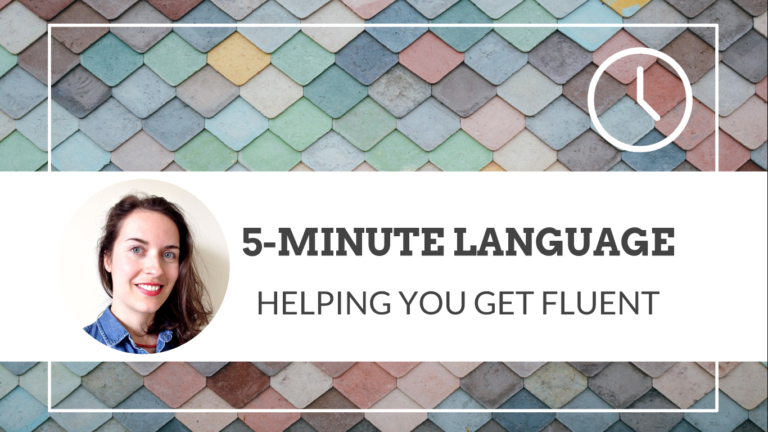Neste vídeo, com duração de 4m23s, Agnieska, do canal 5 Minute Language, responde à pergunta: “É possível aprender um idioma estudando sozinho?”. E a resposta é SIM, 90% do aprendizado você pode fazer por conta própria, e os outros 10% consistem em praticar a conversação, o que também não é complicado. Você pode falar com você mesmo, por exemplo. Mas vale a pena aventurar-se e procurar parceiros para conversação, o que pode parecer intimidante e assustador, mas vale a pena, pois saimos da nossa zona de conforto e é neste momento que realmente começamos a aprender.
| English Transcript | Tradução |
|---|---|
| Hi everyone and welcome to the Five Minute Language YouTube channel. | Olá a todos e bem-vindos ao canal "Five Minute Language" do YouTube. |
| My name is Agnieska and today I'm going to tackle the question of "can you learn a language by yourself"? | Meu nome é Agnieska e hoje vou abordar a questão: "você pode aprender um idioma sozinho"? |
| But before I do that, | Mas antes de fazer isso, |
| make sure you subscribe to the channel | certifique-se de se inscrever no canal |
| and give this video a thumbs up | e dê um joinha nesse vídeo |
| and also share your experiences in the comments below, | e também compartilhe suas experiências nos comentários abaixo, |
| I really appreciate it. | Eu ficarei realmente agradecida. |
| So the question of, "can you learn a language by yourself". | Portanto, a questão de "você pode aprender um idioma sozinho". |
| If you've been watching this channel for a while or reading my blog five-minute language, | Se você assiste a este canal há algum tempo ou lê o meu blog "Five Minute Language", |
| then you probably already know the answer to this question, | então você provavelmente já sabe a resposta para esta pergunta, |
| or at least you know what I'm going to say. | ou pelo menos você sabe o que vou dizer. |
| And I'm going to say yes, yes, | E eu vou dizer sim, sim, |
| you can learn a language by yourself. | você pode aprender um idioma sozinho. |
| But there is a "but", there's always a "but" | Mas há um "mas", sempre há um "mas" |
| and I'm going to talk to you about that in a minute. | e vou falar com você sobre isso em um minuto. |
| But let me just tell you a little story about something that one of my subscribers actually asked me the other day, | Mas deixe-me contar uma pequena história sobre algo que um dos meus assinantes realmente me perguntou um outro dia, |
| which was whether it's possible to know a language | que era se é possível conhecer um idioma |
| and to be fluent in it, | e ser fluente nele, |
| if you can't speak it. | se você não pode falar. |
| So this person is basically saying that they can, | Então, essa pessoa está basicamente dizendo que pode, |
| that they know a lot of vocabulary, | que eles conhecem muito vocabulário, |
| that they feel like they can read and they can write very well, | que eles sentem que sabem ler e escrever muito bem, |
| they can understand everything they're reading, | eles podem entender tudo o que estão lendo, |
| but they can't actually speak the language they're learning, | mas não conseguem falar o idioma que estão aprendendo, |
| they're not interested in speaking, | eles não estão interessados em falar, |
| they don't know anyone who speaks the language they're learning. | eles não conhecem ninguém que fala o idioma que estão aprendendo. |
| But really, can they consider themselves fluent if they know it, | Mas, realmente, eles podem se considerar fluentes se conhecem o idioma, |
| if they have it in their head? | se eles o têm na cabeça? |
| Normally, the advice I would give you is that | Normalmente, o conselho que eu daria a você é que |
| when you're learning a language, | quando você está aprendendo um idioma, |
| you should basically be driven by your goals. | você deve basicamente ser guiado por seus objetivos. |
| So, depending on what your goal is, | Então, dependendo do seu objetivo, |
| success will look differently for everyone. | cada um terá uma medida diferente de sucesso. |
| So, for example, | Então, por exemplo, |
| if your goal is to travel and to have conversations with people, | se seu objetivo é viajar e conversar com pessoas, |
| to meet new people, | conhecer novas pessoas, |
| then obviously you need to focus on speaking, | então, obviamente, você precisa se concentrar em falar, |
| because that's what will help you with your goal. | porque é isso que o ajudará com seu objetivo. |
| If your goal is to just watch films, | Se seu objetivo é apenas assistir filmes, |
| foreign films without subtitles, | filmes estrangeiros sem legendas, |
| then you should be focusing on listening. | então você deve se concentrar em ouvir. |
| So your way of studying will be driven by your goal. | Portanto, sua maneira de estudar será orientada por seu objetivo. |
| But having said that, | Mas tendo dito isso, |
| I also need to say that speaking is an important part of language learning | Eu também preciso dizer que falar é uma parte importante do aprendizado de idiomas |
| even if it's not your priority. | mesmo que não seja sua prioridade. |
| And why is that? | E por que isto? |
| It's because basically, | É porque basicamente, |
| when you're neglecting speaking, | quando você está negligenciando a fala, |
| you might be making your progress much slower. | você pode tornar o seu progresso muito mais lento. |
| And it's because when you practice speaking | E é porque quando você pratica falando |
| what you basically do is you consolidate your knowledge, | o que você basicamente faz é consolidar seu conhecimento, |
| you kind of solidify it in your memory | você meio que o solidifica na sua memória |
| and you basically become more fluent. | e você basicamente se torna mais fluente. |
| So you get better at reading, | Então você melhora a leitura, |
| you get better at listening, | você consegue ouvir melhor, |
| and you get better at sounding natural. | e você fica mais natural. |
| And knowing what natural language is | E fica sabendo o que é a linguagem natural |
| and what unnatural language is. | e o que é a linguagem não natural. |
| And knowing this difference helps you become better in all aspects of language learning. | E conhecer essa diferença ajuda a melhorar todos os aspectos do aprendizado de idiomas. |
| So, speaking is definitely something that you should be doing. | Então, falar é definitivamente algo que você deveria estar fazendo. |
| And what I mean by speaking is | E o que quero dizer com falar é |
| it doesn't have to be necessarily having conversations with people. | não precisa necessariamente conversar com as pessoas. |
| Speaking is, you know, saying a three word sentence, that's speaking. | Falar é dizer uma sentença de três palavras. |
| Speaking to yourself is speaking as well. | Falar consigo mesmo também é falar. |
| So speaking doesn't have to be a kind of, a social activity, | Então, falar não precisa ser um tipo de atividade social, |
| although I would definitely say, | embora eu definitivamente diga, |
| if you do have opportunity, or if you don't, | se você tiver oportunidade, ou se não tiver, |
| seek out those opportunity. | procure por essas oportunidades. |
| So going back to the question of "can you learn a language at home", | Então, voltando à questão de "você pode aprender um idioma em casa", |
| yes, you can, and you can probably do 90% of it if you want a number | sim, você pode, e provavelmente pode fazer 90% do aprendizado, se quiser um número |
| and the remaining 10% will be speaking, | e os 10% restantes é a praticar a fala, |
| so going out there, | então ir para a rua, |
| finding even native speakers | encontrar até mesmo falantes nativos |
| or speakers of that language, | ou falantes dessa língua, |
| and having conversations, | e conversar, |
| and that because, it puts you in a situation where it's a bit scary, | e isso te coloca em uma situação que é um pouco assustadora, |
| it's a bit challenging and overwhelming, | e também um pouco desafiadora e esmagadora, |
| and it's a good thing, because you're challenging yourself when you speak, | e é uma coisa boa, porque você estará se desafiando ao falar, |
| so that 10% is the "but" that I mentioned at the start of the video. | de modo que os 10% é o "mas" que mencionei no início do vídeo. |
| So yes, you can learn a language by yourself, | Então, sim, você pode aprender um idioma sozinho, |
| but you also need a little bit of, kind of external motivation. | mas você também precisa de um pouco de motivação externa. |
| External practice, which is speaking. | Prática externa, que é praticar a conversação. |
| So I hope you enjoyed this video, | Espero que tenham gostado deste vídeo, |
| make sure you subscribe, | não se esqueça de se de se inscrever, |
| make sure you give this video a thumbs up, | e de dar um joinha neste vídeo, |
| and I'll see you next time. | e até a próxima. |
| Bye | Tchau |
Contagem de Palavras
A tabela abaixo exibe as palavras encontradas neste vídeo bem como o número de vezes em que aparecem.
| Freq. | Palavra | Freq. | Palavra | Freq. | Palavra |
|---|---|---|---|---|---|
| 40 | you | 24 | and | 24 | a |
| 20 | to | 18 | is | 16 | language |
| 15 | the | 15 | that | 15 | of |
| 14 | speaking | 13 | so | 12 | your |
| 12 | can | 11 | they | 10 | if |
| 10 | but | 9 | it | 9 | be |
| 8 | in | 8 | I | 7 | what |
| 7 | this | 7 | know | 7 | it's |
| 7 | by | 6 | yourself | 6 | going |
| 6 | at | 5 | learning | 5 | learn |
| 5 | have | 5 | goal | 5 | because |
| 5 | basically | 4 | yes | 4 | will |
| 4 | when | 4 | video | 4 | they're |
| 4 | say | 4 | question | 4 | or |
| 4 | I'm | 4 | do | 4 | better |
| 3 | you're | 3 | with | 3 | then |
| 3 | sure | 3 | speak | 3 | should |
| 3 | reading | 3 | people | 3 | on |
| 3 | need | 3 | my | 3 | minute |
| 3 | make | 3 | kind | 3 | having |
| 3 | give | 3 | get | 3 | for |
| 3 | fluent | 3 | conversations | 3 | channel |
| 3 | bit | 3 | also | 3 | % |
| 2 | would | 2 | which | 2 | well |
| 2 | up | 2 | thumbs | 2 | there |
| 2 | that's | 2 | subscribe | 2 | speakers |
| 2 | something | 2 | saying | 2 | really |
| 2 | probably | 2 | practice | 2 | out |
| 2 | opportunity | 2 | not | 2 | natural |
| 2 | me | 2 | little | 2 | listening |
| 2 | knowing | 2 | just | 2 | five |
| 2 | films | 2 | external | 2 | everyone |
| 2 | even | 2 | driven | 2 | don't |
| 2 | doesn't | 2 | definitely | 2 | challenging |
| 2 | can't | 2 | become | 2 | actually |
| 2 | about | 1 | you've | 1 | youtube |
| 1 | write | 1 | word | 1 | without |
| 1 | why | 1 | who | 1 | while |
| 1 | whether | 1 | where | 1 | welcome |
| 1 | way | 1 | watching | 1 | watch |
| 1 | was | 1 | want | 1 | vocabulary |
| 1 | very | 1 | unnatural | 1 | understand |
| 1 | travel | 1 | today | 1 | time |
| 1 | three | 1 | those | 1 | thing |
| 1 | there's | 1 | themselves | 1 | their |
| 1 | tell | 1 | talk | 1 | tackle |
| 1 | success | 1 | subtitles | 1 | subscribers |
| 1 | studying | 1 | story | 1 | start |
| 1 | speaks | 1 | sounding | 1 | solidify |
| 1 | social | 1 | slower | 1 | situation |
| 1 | share | 1 | sentence | 1 | seek |
| 1 | see | 1 | scary | 1 | said |
| 1 | remaining | 1 | read | 1 | puts |
| 1 | progress | 1 | priority | 1 | possible |
| 1 | person | 1 | part | 1 | overwhelming |
| 1 | other | 1 | one | 1 | obviously |
| 1 | number | 1 | normally | 1 | next |
| 1 | new | 1 | neglecting | 1 | necessarily |
| 1 | native | 1 | name | 1 | much |
| 1 | motivation | 1 | more | 1 | might |
| 1 | mentioned | 1 | memory | 1 | meet |
| 1 | mean | 1 | making | 1 | lot |
| 1 | look | 1 | like | 1 | let |
| 1 | least | 1 | knowledge | 1 | interested |
| 1 | important | 1 | I'll | 1 | hope |
| 1 | home | 1 | hi | 1 | helps |
| 1 | help | 1 | head | 1 | good |
| 1 | goals | 1 | foreign | 1 | focusing |
| 1 | focus | 1 | finding | 1 | feel |
| 1 | experiences | 1 | example | 1 | everything |
| 1 | enjoyed | 1 | doing | 1 | differently |
| 1 | difference | 1 | depending | 1 | day |
| 1 | consolidate | 1 | consider | 1 | comments |
| 1 | bye | 1 | blog | 1 | below |
| 1 | before | 1 | been | 1 | back |
| 1 | aspects | 1 | asked | 1 | as |
| 1 | appreciate | 1 | anyone | 1 | answer |
| 1 | an | 1 | always | 1 | although |
| 1 | already | 1 | all | 1 | agnieska |
| 1 | advice | 1 | activity |










